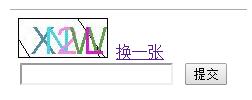日期: 2020-06-23 12:51:43
昨晚在csdn看到一位前辈写一个ajax+servlet+jsp验证,顿时心血来潮,在阅读前辈的代码下我亲手体验一下,做了一个验证码生成工具类,以供大家做个参考。
1、添加VeriyCodeUtils类生成验证码图像
package com.servlet;
import java.awt.Color;
import java.awt.Font;
import java.awt.Graphics2D;
import java.awt.image.BufferedImage;
import java.io.OutputStream;
import java.util.Random;
import javax.imageio.ImageIO;
/**
*
* @author hubiao
* 验证码生成器
* 用到API
* BufferedImage 创建一个图像
* Graphics2D 绘制
* fillRect(x,y,width,height);背景
* font()字体
* drawRect();边框
* drawLine();线
* drwaString:图像数据
* ImageIO 生成图像
*/
public class VeriyCodeUtils {
/**
* @param output 保存验证图像的流
* @return 验证码
*/
public static String newVeriyCode(OutputStream output)
{
int width = 90;
int height = 40;
int codeCount = 5;
char[] codeSequence = { 'A', 'B', 'C', 'D', 'E', 'F', 'G', 'H', 'I', 'J',
'K', 'L', 'M', 'N', 'O', 'P', 'Q', 'R', 'S', 'T', 'U', 'V', 'W',
'X', 'Y', 'Z', '0', '1', '2', '3', '4', '5', '6', '7', '8', '9' };
//创建图像对象,8位RGB
BufferedImage buffered = new BufferedImage(width, height, BufferedImage.TYPE_INT_RGB);
//通过Crapahices来绘制图像到BufferedImage中
Graphics2D gra = buffered.createGraphics();
//设置图片背景:白色
gra.setColor(Color.WHITE);
gra.fillRect(0, 0, width, height);
//设置字体,字体大小根据图片高度决定
gra.setFont(new Font("Fixedsys",Font.PLAIN,height-2));
//设置边框:黑色,1cm
gra.setColor(Color.BLACK);
gra.drawRect(0, 0, width-1, height-1);
//生成10条黑色干扰线
gra.setColor(Color.BLACK);
Random ran = new Random();
for(int i = 0; i < 70;i++)
{
int x = ran.nextInt(255);
int y = ran.nextInt(255);
int x1 = ran.nextInt(255);
int y1 = ran.nextInt(255);
gra.drawLine(x, y,x+x1, y+y1);//画直线
}
//生成验证码
StringBuffer sb = new StringBuffer();
int r = 0,g = 0,b = 0;
for(int i = 0; i < codeCount; i++)
{
String strRand = String.valueOf(codeSequence[ran.nextInt(codeSequence.length)]);
//对每位验证码都生成不同的颜色,增加识别系统难度
r = ran.nextInt(255);
g = ran.nextInt(255);
b = ran.nextInt(255);
gra.setColor(new Color(r, g, b));
gra.drawString(strRand, (i+1)*13, height-4);
sb.append(strRand);
}
try {
ImageIO.write(buffered, "jpeg", output);
} catch (Exception e) {
throw new RuntimeException(e);
}
return sb.toString();
}
}
2、servlet使用验证码
protected void doPost(HttpServletRequest req, HttpServletResponse resp)
throws ServletException, IOException {
//禁止图像缓存
resp.setHeader("Pragma", "no-cache");
resp.setHeader("Cache-Control", "no-cache");
resp.setDateHeader("Expires", 0);
resp.setContentType("image/jpeg");
//生成验证码图像
String veriyCode = VeriyCodeUtils.newVeriyCode(resp.getOutputStream());
//将验证码保存到session中
HttpSession session = req.getSession();
session.setAttribute("validateCode", veriyCode);
}
3、JSP页面使用验证码
</head>
<script type="text/javascript">
function createCode()
{
var t = new Date().getTime();//防止页面缓存,使用时间搓
var srcImg = document.getElementById("srcImg");
srcImg.src="/ImgVeifyWeb/vity.do?"+t;
}
</script>
<body>
<h1>${requestScope.code}</h1>
<img id="srcImg" src="<c:url value="/vity.do"></c:url>" /> #这里使用直接让img访问servlet,通过response响应一个图像流
<a href="##" rel="external nofollow" id="codeId" onclick="createCode()">换一张</a>
<form action="<c:url value="/hello.do"></c:url>" method="post">
<input type="text" name="codeVify"/>
<input type="submit" value="提交"/>
</form>
</body>
4、校验验证码
protected void doPost(HttpServletRequest req, HttpServletResponse resp)
throws ServletException, IOException {
HttpSession session = req.getSession();
Object validateCode = session.getAttribute("validateCode");
System.out.println(validateCode);
String codeVify = req.getParameter("codeVify");
if(codeVify==null || codeVify.equals(""))
{
req.setAttribute("code","验证证不能为空");
req.getRequestDispatcher("/index.jsp").forward(req, resp);
return;
}else if(!validateCode.toString().equalsIgnoreCase(codeVify))
{
req.setAttribute("code","验证证错误");
req.getRequestDispatcher("/index.jsp").forward(req, resp);
return;
}
System.out.println("下面开始 做其他业务操作....");
}
校验图如下:

以上就是本文的全部内容,希望对大家的学习有所帮助,也希望大家多多支持奥多码。